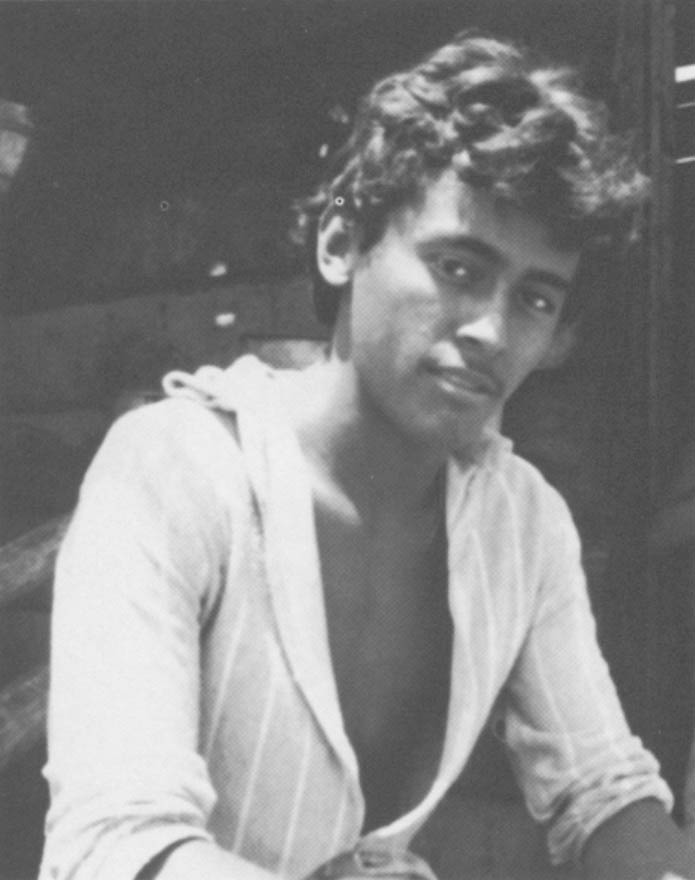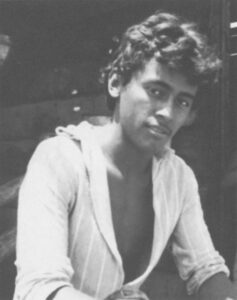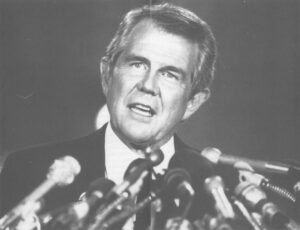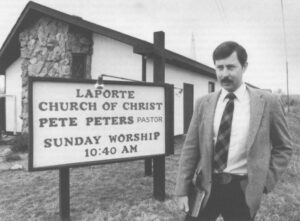TEGUCIGALPA–Rev. Allen Danforth steps on the gas pedal and wheels the metallic blue custom van past Honduras’ National Stadium. To the right, a city of squatter slums stretches toward the horizon. On the left, “Fuera Contras!” is scrawled in red on the stadium wall. The message–”Leave Contras!” is evidence of increasing opposition to the American-backed “Contra” guerrillas who use Honduras as a base camp for attacking neighboring Nicaragua.
“We’re seeing more of that every day,” says Rev. Danforth pointing to the slogan. “That’s one reason it’s so important that we are here, as Christians and as Americans. Religion aside, Honduras is the front line between communism and Texas. Communism draws its base of support in poor countries by providing people with their basic needs,” he continues. “They do it with things like low cost medical care. We can be a powerful tool to eliminate that, to head communism off at the pass, in the name of Jesus Christ.”
In the name of Jesus Christ and anti-communism, America’s “Christian Right” has emerged as a major religious and political influence in Honduras, forming the foundation for private, humanitarian aid to the Contra rebels and their families. The evangelicals have mounted a supply effort that parallels the still-unraveling scandal around secret White House efforts to ship arms to the Nicaraguan rebels, despite Congressional prohibitions. Private evangelical relief organizations, including Danforth’s $3million-a-year program and William Murray’s $3 million Freedom’s Friends operation report they have poured more than $10 million in private aid into Honduras in the past two years. The aid helps local churches, refugees from Nicaragua and contra soldiers.
“Without us,” says Murray, “the Freedom Fighters (contras) would have been in rough shape the last few years.”
The Honduran crusade represents a new, aggressive phase in the growing political involvement of America’s conservative Christian movement. It is just one example of how the American Christian Right has become involved in world affairs as never before.
Focusing on hotspots in Latin America, Africa and the Middle East, the evangelicals are sending out hundreds of missionaries, backed by millions of dollars to compete for the hearts, minds, and souls of the world.
While the Christian Right’s foreign involvement is most visible in Honduras, the movement has a wide range of initiatives including;
South Africa–Evangelicals are at the core of U.S. support for South Africa’s white minority government. Rev. Jerry Falwell traveled there last year, returning to lambaste Nobel laureate Rev. Desmond Tutu as “a phony.” Local churches have joined an “airlift” to fly members to South Africa to demonstrate their support. And last year, at a time when South Africa’s leaders refused to talk to the secular media, television evangelist Pat Robertson featured a live interview with Foreign Minister Pik Botha on his 700 Club program.
The Middle East–Robertson operates the region’s most powerful television transmitter and recently returned from what his aides called a pastoral visit to Israel where he met with government leaders. Evangelicals, who believe Israel’s creation fulfilled Biblical prophecy, staunchly support Israel, and Israeli officials appear frequently on the evangelists’ TV programs.
Latin America–Evangelicals are deeply involved in the region, from Chile where they support Gen. Augusto Pinochet’s oppressive regime, to El Salvador where Jimmy Swaggart has established a private school system that now serves more than 13,000 children at 19 schools. Evangelicals say they are volunteers in an American counter-revolutionary effort in Central America.
Rising Power
The evangelicals are welcomed by pro-American government officials who view them as a stabilizing political influence. Honduras’ vice president, for example, flew to Houston to persuade Danforth, who had some missionary experience, to leave a local church and come work in his country. That’s when Danforth founded his organization called World Gospel Outreach. Danforth said the Honduran government has also provided him with logistical support, loading his medical supplies onto military planes that ferry weapons from the U.S. to Tegucigalpa. In neighboring Guatemala evangelicals have been issued special military passes to work in areas where Catholic priests, who were beginning to organize peasant unions and cooperatives, have been banned.
In the competition among religions, the evangelicals also benefit from the religious vacuum created by the declining numbers of Catholic priests worldwide. The Catholic church is the dominant church throughout the Third World, but the evangelicals are rising in numbers and power. In Brazil, for example, the Catholic church estimates there are four times as many evangelists in local churches as there are parish priests. And the evangelical worship style, featuring emotional services and soulful singing, seems to appeal to people who live difficult, impoverished lives. The evangelicals offer the promise of an idyllic afterlife without demanding that members try to change society.
On a warm spring night in Honduras, the signs of the evangelicals’ success can be seen and heard across the capital city. In a large house in one exclusive neighborhood Allen Danforth hosts a dozen visiting American contributors at a pot luck supper. In a dining room at the exclusive Hotel Maya more than 100 businessmen praise the Lord in song at the weekly meeting of a kind of religious Rotary Club called the Full Gospel Businessmen’s Fellowship. In a slum outside the city center, the Centro Evangelista is packed with worshippers who speak in tongues and sing along with the Gospel music coming from a small tape player. And at El Cenaculo, a modern evangelical church in downtown Tegucigalpa, middle class families flock to hear a visiting American preacher.
“The evangelical movement is sweeping Latin America,” says Rev. Roy May of the Methodist Board of Global Ministries. In less than a decade evangelicals have risen from less than 5 percent of the population in most Latin countries, to between 10 and 30 percent. One Catholic Church study estimated the evangelicals win 400 converts every hour in Latin America.
Rev. May, who works in Central America, is critical of the evangelicals who, he says, “pacify people, numb them to their poverty. The result is to blunt the social activism that they think threatens pro-American leaders in these countries. And while they say they are non-political, I think teaching people to withdraw from voting and involvement is, in itself, political.”
Thomas Quigley, an analyst for the U.S. Catholic Bishops Conference, says pro-American military leaders in many countries consider the evangelicals “an antidote to the liberal Catholic activists they fear.” The American evangelicals train local leaders in months “unlike the Catholic church, which takes years to train a priest,” adds Quigley. “They can pretty quickly build a church where one didn’t exist before.” The pattern is being repeated throughout the Third World, adds Quigley, “and it has a social, religious and political effect.”
Wherever they work, the evangelicals seem to pursue both religious and political goals. And they find themselves in direct conflict with another major Christian trend–Liberation Theology–which depicts Christ as a political liberator and encourages the poor to organize and even take arms in order to improve life on earth. Since 1978 Liberation Theology has contributed to the mass movements that led to the overthrow of pro-American dictators in Nicaragua, the Philippines and Haiti.
In contrast, the American evangelicals are steeped in a theology that places America at the center of God’s plan for the world. Theirs is the most American of Christian faiths. Its roots can be traced to 19th century Americans who viewed their country as a kind of “new Israel” where believers would be drawn close to God. Evangelicals believe in literal interpretations of the Bible; that God literally created the universe in seven days and Noah’s ark was real. Evangelicals are “born again”, which means they have accepted Jesus Christ as their spiritual savior.
The great majority of evangelicals are politically conservative, and they demonstrated their conservatism in the past decade as new leaders gradually drew them into politics behind conservative candidates. For generations evangelicals have avoided politics, considering it a lowly human affair. Now their leaders preach a social Gospel that attacks communism and protects the power of U.S. allies. They follow a theology that stresses America’s role as a power for good in the world. And because they believe that the end of the world and Christ’s Second Coming, are imminent, the evangelicals stress a spiritual life focused on the hereafter, rather than the social action preached by more liberal Christians.
“I can see where Liberation Theology would be attractive to an oppressed person. But it’s attracting people only because we evangelicals haven’t done our job in the past,” says American evangelist Don Stewart. “Now we’re finally starting to do the Lord’s work in the world,” Stewart’s Phoenix-based ministry spends $25 million a year in the Third World. A tall man with a striking shock of gray and black hair, Stewart believes the evangelical message of spiritual salvation can compete with Liberation Theology’s social activism. Early this year he visited Honduras to preach and begin new projects in conjunction with El Cenaculo.
“Liberation Theology is not Biblical,” he says, “and we can show people that. Christ was not a leftist revolutionary.”
As a counter-revolutionary force, the Christian Right’s efforts are changing the political and religious landscape. In predominately Catholic Latin America, the evangelicals have converted millions, prompting alarm in the Catholic Church. The Brazilian Catholic bishops, renowned for their liberal approach to social problems, are so concerned about the evangelicals that they have issued a statement suggesting the missionaries are directed by the American Central Intelligence Agency. In Chile, liberal Catholics call the evangelicals “Reagan cults.”
While they may mirror President Reagan’s concerns, and work closely with American-backed leaders, the New Right Christians are led not by the CIA, but by major television preachers such as Robertson, Falwell and Jimmy Swaggart. The big TV evangelists use satellites to broadcast their messages worldwide, and have established missions in dozens of countries. Swaggart alone spent $15 million on overseas missions in 1986, according to his Honduran coordinator.

None of the major television evangelists were available for interviews on their foreign involvement. However, they have all spoken out frequently on foreign affairs, praying for their allies abroad and reviewing their aid programs on television broadcasts. Rev. Falwell, for example, returned from a 1985 trip to South Africa and announced he would launch a public relations campaign on behalf of the white government there. Falwell has also voiced strong support for the Nicaraguan contras and for President Reagan’s “Star Wars” space defense plan.
Rev. Pat Robertson, who has long considered a run for the White House, has been outspoken on many foreign issues. In 1985, before Congress voted on aid for the contras, Robertson told viewers, “I want us to pray about the voting Congress because this is a very important vote and the craven submission of our leaders and the Congress to the sick demands of communism makes you sick to your stomach.” In 1986 Robertson spoke against Corazon Aquino’s bid to defeat the Philippines dictator Ferdinand Marcos. Robertson described Aquino as “essentially a housewife.” He said, “I don’t think Corazon Aquino, very frankly, has the capacity to govern.”
Honduras is where a broad spectrum of Christian Right activists has taken a stand together, answering President Reagan’s call to support the “freedom fighters” who use Honduras as a base to fight the Marxist government of Nicaragua. Christian Right leaders consider communism one of Satan’s evils, and they believe, along with President Reagan, that communist Nicaragua is an imminent threat to the U.S.
Pat Robertson’s Operation Blessing is the most visible evangelical initiative in Honduras. Through Operation Blessing Robertson has reported it sent more than $3 million in aid for Nicaraguan refugees, a large number of whom are Contra supporters or relatives. He is so popular among the contras that one group named itself the Pat Robertson Brigade. Robertson has visited Honduras to review the contra troops, and he has featured the contras on his nationwide TV program.
“I was Catholic in Nicaragua but it wasn’t something I took seriously,”’ says Porfirio Aleman, an 18year-old refugee who recently joined the evangelical church at a refugee camp in Danli, near the Nicaraguan border. “I’ve listened to the preachers and what they say about the world being so chaotic and there being only one way you can be saved. Since I was born again, I’ve had more peace in my heart.”
The church where Aleman was “born-again” was built by funds from American television evangelist Jimmy Swaggart, whose TV show–dubbed so well many Hondurans believe he speaks Spanish–is the hub of an operation run from a full floor of offices in downtown Tegucigalpa. Swaggart and his denomination, the Assemblies of God, support medical programs, schools, and a Bible college in Honduras.
But while the big name TV preachers play highly visible roles in Honduras, much of the evangelical work is carried out by small, obscure groups such as Rev. Danforth’s World Gospel Outreach. Another group, called Salt and Light, works in the jungles of coastal La Mosquitia, operating schools, an airstrip and aid programs for local Indians, refugees and some of the families of contra rebels. And William Murray’s Freedom’s Friends sent $3 million in aid to Nicaraguan refugees. Murray, the group’s founder, is popular in evangelical circles because he is the born-again son of famous atheist Madeline Murry O’Hair.
Although the evangelicals say the aid sent to Honduras is for civilian refugees, many admit that some supplies are channeled to contra fighters. For example, medical personnel who have worked in border areas have said they cannot distinguish between contra fighters and civilians who receive their care. And the aid that does go to women and children–many of whom are relatives of contra rebels–is integral to the contra army’s cause.

“Most relief organizations will help left-leaning groups only,” says Murray. “We’re part of what can be called a Christian, anti-Communist movement and we will help the freedom fighters. Let’s face it, food and medicine have become political tools, and we’re the ones willing to use them against the evil of communism. Those priests in Nicaragua, with their Liberation theology, are among the most murderous torturers in the world.”
Murray, who divides his time between fundraising in the U.S. and supervising his aid program in Honduras, believes that America’s political interests, and Christian faith, are intertwined. The concept goes back to the 19th century foundations of evangelical faith, when America was viewed as God’s promised land. The idea is, echoed in the blending of faith and patriotism in many evangelical programs. “You can make a strong case,” Murray adds, “for saying the American way is synonymous with Christianity.”
While Murray and others emphasize refugee work, more traditional missionaries have built local churches across Honduras. In the slums around Tegucigalpa, where there seem to be tiny evangelical churches on every hilltop, thousands of converts testify to the success of the missionary efforts. A country that 10 years ago was almost 100 percent Catholic, is now nearly 20 percent evangelical.
“We have to accept what God has given us, and even be grateful,” says Isabelle Godoy de Lopez, a 47-year-old woman who lives in one of hundreds of tumble-down squatter shacks in a neighborhood north of the city. Godoy first came in contact with American evangelical missionaries when her children attended a local mission school. She says her children were taught religion before each noon meal. “At first I was drawn to the material things they offered,” she adds, “but now I think it was the help of the Lord because now I’m a believer too.”
Her new faith is clearly a source of strength. Mrs. Godoy says the women in her church form a support group that helps ease the grinding strain of life in one of the poorest neighborhoods in one of the poorest countries in the world. “When I have problems, they are with me. It’s something I didn’t have in the Catholic Church,” she says.
The pastor at Iglesia Santidad, Mrs. Godoy’s church, was trained by Americans at a local Bible school. In less than 18 months he was educated and ordained and sent out to establish a mission. He built his small chapel in the middle of the slum, making it more accessible than the Catholic church, which is more than two miles away. “Honduras needs evangelism even more than other places because it is fighting the communist Satan,” says Juan Bautista Selgado. “We talk about communism, but usually we talk about personal, spiritual salvation. That’s what the people here need.”
Rev. Selgado and Mrs. Godoy, who struggles to feed her family of seven on $30 per week, are living proof of what worries the evangelicals’ critics. Rev. Roy May says the evangelicals serve American political interest, and keep often corrupt government in power, by teaching the poor to accept the status quo.
“The message here is, ‘Human action is not possible, and besides that, the end of the world is coming soon anyway, and that will take care of all our problems.’” It’s a message that clashes with the 20 year-old trend among liberal missionaries who encourage the poor to form unions, cooperatives and even political movements to better themselves. “With evangelicals,” adds May, “you are absolved from really trying. All that’s important is your personal relationship to God.”
Mrs. Godoy says she is concerned more with life after death than with improving conditions for herself or her children. Voting “is earthly, part of the laws of man, and we don’t do it,” she says. She believes the end of the earth–in a Biblically prophesied Armageddon battle–is near, and that it will be followed by the Second Coming of Christ. She believes that she and the world’s millions of evangelicals will be saved from the destruction to live with Christ. In the meantime, “This religion can help us accept life as it is.”
©1987 Michael D’Antonio
Michael D’Antonio, a reporter on leave from Newsday, is reporting on Christian America.



